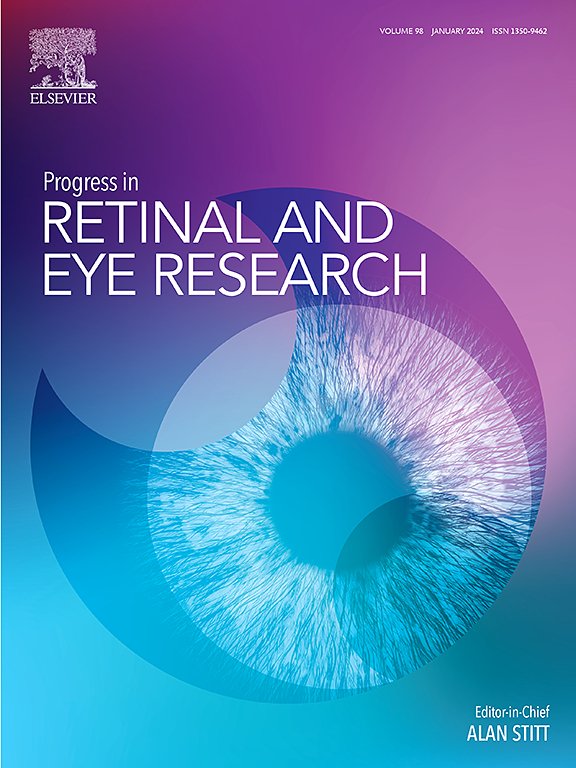The relationship between intraocular pressure and glaucoma: An evolving concept
IF 14.7
1区 医学
Q1 OPHTHALMOLOGY
引用次数: 0
Abstract
Intraocular pressure (IOP) is the most important modifiable risk factor for glaucoma and fluctuates considerably within patients over short and long time periods. Our field's understanding of IOP has evolved considerably in recent years, driven by tonometric technologies with increasing accuracy, reproducibility, and temporal resolution that have refined our knowledge regarding the relationship between IOP and glaucoma risk and pathogenesis. The goal of this article is to review the published literature pertinent to the following points: 1) the factors that determine IOP in physiologic and pathologic states; 2) technologies for measuring IOP; 3) scientific and clinical rationale for measuring diverse IOP metrics in patients with glaucoma; 4) the impact and shortcomings of current standard-of-care IOP monitoring approaches; 5) recommendations for approaches to IOP monitoring that could improve patient outcomes; and 6) research questions that must be answered to improve our understanding of how IOP contributes to disease progression. Retrospective and prospective data, including that from landmark clinical trials, document greater IOP fluctuations in glaucomatous than healthy eyes, tendencies for maximal daily IOP to occur outside of office hours, and, in addition to mean and maximal IOP, an association between IOP fluctuation and glaucoma progression that is independent of mean in-office IOP. Ambulatory IOP monitoring, measuring IOP outside of office hours and at different times of day and night, provides clinicians with discrete data that could improve patient outcomes. Eye care clinicians treating glaucoma based on isolated in-office IOP measurements may make treatment decisions without fully capturing the entire IOP profile of an individual. Data linking home blood pressure monitors and home glucose sensors to dramatically improved outcomes for patients with systemic hypertension and diabetes and will be reviewed as they pertain to the question of whether ambulatory tonometry is positioned to do the same for glaucoma management. Prospective randomized controlled studies are warranted to determine whether remote tonometry-based glaucoma management might reduce vision loss and improve patient outcomes.
眼压与青光眼的关系:一个不断演变的概念。
眼内压(IOP)是青光眼最重要的可改变风险因素,在患者体内的短期和长期波动都很大。近年来,眼压测量技术的准确性、可重复性和时间分辨率不断提高,完善了我们对眼压与青光眼风险和发病机制之间关系的认识。本文旨在回顾与以下几点相关的已发表文献:1) 生理和病理状态下决定眼压的因素;2) 测量眼压的技术;3) 测量青光眼患者各种眼压指标的科学和临床依据;4) 当前标准护理眼压监测方法的影响和不足;5) 可改善患者预后的眼压监测方法建议;6) 必须回答的研究问题,以提高我们对眼压如何导致疾病进展的认识。回顾性和前瞻性数据(包括来自具有里程碑意义的临床试验的数据)显示,青光眼患者的眼压波动比健康眼更大,每日最大眼压往往发生在非诊室时间,而且除了平均和最大眼压外,眼压波动与青光眼进展之间也存在关联,这种关联与诊室平均眼压无关。非卧床眼压监测可在非办公时间、白天和晚上的不同时段测量眼压,为临床医生提供离散数据,从而改善患者的治疗效果。眼科临床医生在治疗青光眼时,可能会根据诊室内的孤立眼压测量结果做出治疗决定,而无法全面了解患者的整个眼压状况。将家用血压计和家用血糖传感器与显著改善全身性高血压和糖尿病患者的治疗效果联系起来的数据,将与非卧床眼压测量是否能为青光眼治疗带来同样效果的问题联系起来进行审查。有必要进行前瞻性随机对照研究,以确定基于远程眼压测量的青光眼管理是否可以减少视力损失并改善患者的治疗效果。
本文章由计算机程序翻译,如有差异,请以英文原文为准。
求助全文
约1分钟内获得全文
求助全文
来源期刊
CiteScore
34.10
自引率
5.10%
发文量
78
期刊介绍:
Progress in Retinal and Eye Research is a Reviews-only journal. By invitation, leading experts write on basic and clinical aspects of the eye in a style appealing to molecular biologists, neuroscientists and physiologists, as well as to vision researchers and ophthalmologists.
The journal covers all aspects of eye research, including topics pertaining to the retina and pigment epithelial layer, cornea, tears, lacrimal glands, aqueous humour, iris, ciliary body, trabeculum, lens, vitreous humour and diseases such as dry-eye, inflammation, keratoconus, corneal dystrophy, glaucoma and cataract.

 求助内容:
求助内容: 应助结果提醒方式:
应助结果提醒方式:


